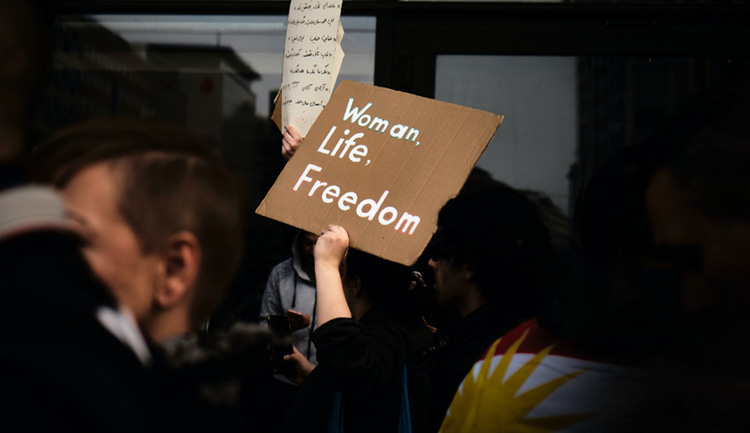Among the many challenges Western women faced in the post-911 world was the weaponization of the oppression of Muslim women against us. It is not only a moral imperative for Western feminists to support women’s liberation in Iran, their liberation is inextricably linked to our own.
Tensions are running high among women in America as we try to make sense of how we got here, what consequences we have yet to see, and how to clean up the mess in front of us.
When the leaked Dobbs ruling came down, our collective burnout shifted to a rage whose quiet depths we have not even begun to explore. We’ve taken to the streets. We’ve marched. We’re voting in record numbers. We’re not sure of the future, but one thing is clear:
A radical religious faction of our government is taking the first steps toward implementing an autocratic regime.
On the other side of the planet, women who lost their rights 43 years ago to one are demanding a new government. Here’s why Western women should care.
On March 7, 1979, Ayatollah Khomeini, one of the architects of the current oppressive regime in Iran, announced that it would be mandatory in Iran for girls and women to wear hijab. The announcement was met with shock, as even conservative supporters of the Ayatollah and the Islamic Republican Party were opposed to mandatory hijab. The next day, over 100,000 unveiled women and their allies gathered in the streets of Tehran, the capital city of Iran to protest.
Although protestors were attacked by mobs of conservative counter-protestors that hurled stones, knives, and slurs at them, they were initially successful at repealing the mandatory hijab. The Islamic Republic however would not back down and unleashed a successful wave of terror against Liberals, the Left, and women across the country.
By July 1981, mandatory hijab was once again the law of the land. By 1983, the regime introduced corporeal punishment of up to 74 lashes for unveiled women.
Since then, the violence toward unveiled women has only gotten worse, eventually leading to the killings of young women like Mahsa Amini (Zhina Amini) for a false charge of incorrectly wearing her hijab.
Western feminists stood in solidarity with Iranian women back then, there was even an attempt to create an international body to support them. However, as the energy of the Civil Rights era gave way to Wall Street and the era of “greed is good,” the focus of feminists on this side of the world shifted to more pressing matters at home. However, as we enter the post-Dobbs era, we are seeing the same movie play out in front of us.
Like the conservative women in Iran were shocked to watch the party they supported turn against them, so do American Republican women feel betrayed.
They have been appalled that a movement they saw as a way to protect the unborn has played out as a means to oppress women. Republican legislatures across the country are continuing to introduce wildly brutal bills that fine, imprison, and in some cases, execute women for having an abortion.
Some of these draconian laws have already passed. Others are being challenged in the courts.
To tell the full story though, we need to step back 20 years prior, to the post-911 era.
On 911, al-Qaeda, a radical Muslim terrorist organization launched the most successful terror attack on United States soil. In the aftermath, America’s post-Cold War sense of self was shattered.
The threats we only ever saw flickering on our screens in faraway places like Iran were now in front of us. In the haze of anger and fear, the Bush Administration launched two deeply misguided wars. To gain popular support for those wars, we leaned into the worst of our foundational behaviors and “othered” Muslims.
Islamaphobic attacks and hate crimes skyrocketed across the country as talking heads described Muslims as people who hated freedom and hated us “for our freedom”. One of the most successful tactics of Islamophobic propaganda during the time was the aggressive focus on the mistreatment of women in oppressive theocratic regimes like Iran.
Every politician and talking head pushing for the illegal invasion of Iraq would repeat the same talking point:
“Muslims are barbarous, look at how they abuse their women.”
This talking point was repeated ad nauseam to the degree that we all believed that the worst place to live in the world as a woman was any Muslim-dominant country.
Statistics say otherwise.
So do Muslim women.
So does the Quran.
None of those truths mattered unfortunately as the powerful had created a very effective tool. The narrative surrounding the abuse and oppression of women was not only weaponized as a justification for war but as a way to further strip Western women of their rights.
The most obvious example of this can be seen in the anti-hijab laws in the West. The proponents of these bans argue that allowing hijab erodes their culture. The slightest bit of scrutiny shows this argument to be a ridiculous falsehood because why isn’t the thobe or the kufi banned? Why aren’t historical artifacts from other countries banned from their museums? We know the answer and Western women should exercise caution supporting any laws that police the attire of other women. Lest those laws be then turned against your style of dress.
“Injustice anywhere is a threat to justice everywhere. We are caught in an inescapable network of mutuality, tied in a single garment of destiny. Whatever affects one directly, affects all indirectly.”
—Dr. Martin Luther King
This Islamophobic propaganda was a very powerful tool when wielded against Western feminism. Calls for further gender equality in the West were inevitably met with charges of entitlement or ingratitude.
The access to the minimally basic rights we enjoyed in the West was measured against oppressive laws like the mandatory hijab in Iran. These mostly manifested as veiled threats that emphasized that the rights we experienced were mere privileges because Western men were better kind of men than brutish Muslim men.
Pay equity?
We were lucky we could work at all.
Bodily autonomy?
We were lucky we could dance in the streets.
More protections against harassment?
We were lucky we could legally leave the house alone.
In fact, we were lucky we weren’t going to be beheaded in an honor killing (ignore the other ways we’d be killed of course).
The most insidious lines? It was that it was our duty to liberate Muslim women. For Christian women, this meant conversion. For the non-religious, it meant putting aside domestic movements to support Western intervention to “help” these women.
The worst part was it worked.
Women’s rights in the West paused and are now, as we see with Dobbs, currently regressing. Radical right-wing opportunists saw their chance and capitalized on the diversion. Leading us to recently, where a majority, though slim, of White women voted for Donald Trump, an open misogynist and the architect of the Supreme Court that overturned our rights. Mostly identifying as Christian conservatives, it’s not a surprise that 58% of Trump supporters have an “unfavorable” view of Islam.
For Western women first seeing the power of Iranian women in the movement, it is profound. Their courage, resilience, and heroism are incredibly inspiring. These images were even surprising for some considering the dominant narratives of submission around Muslim women. Though it is no wonder we are ignorant of them as our cultures have been cut off from one another since the early days of the Iranian Revolution. So the only thing many of us know is the post-911 Islamophobia propaganda.
However, seeing young women like Hadis Najafi’s bravery in the face of morality police who took her life, we see what we most hope we are.
In Hadis, we see the women we hope we can be when we take on the Dobbs ruling and fight to restore our rights.
Most notably though, seeing the true strength, determination, and sacrifice of Iranian women in the name of human rights breaks the false narratives about who they are and what they face. It instead lifts a mirror to ourselves in the West and we see our reflection. We see how our fates are intertwined.
Their oppression is our oppression. Their liberation is our liberation.
It is time for Western women to stand up in solidarity with Iranian women.
Want to support the liberation movement in Iran? It’s easy. All they’ve asked of us is to “Be our voice.” Talk about what’s happening with the people in your life. Contact your government representatives and tell them no nuclear deal with Iran until there is a new regime. Share and uplift the voices of Iranian women and their allies on social media.
Use your voice until there is change. It’s more powerful than you think.
—natalie michelle
Flommist Natalie Michelle doesn’t have a bio. She just rants. Copyright © 2022 Natalie Michelle.
PLEASE SUPPORT FLOMM
TIPS + DONATIONS DISCREETLY ACCEPTED












